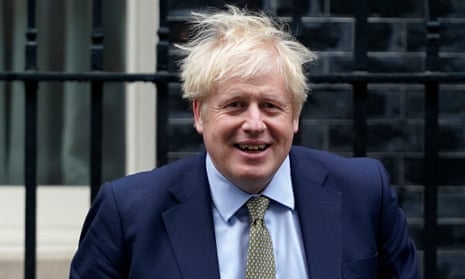Boris Johnson risks jeopardising a free-trade deal with the US unless he pulls the UK out of the Iran nuclear deal, a leading Republican voice on Iran has said.
The warning by Richard Goldberg, until last week a member of the White House national security council (NSC), highlights the dilemmas UK foreign and defence policymakers will face as Britain tries to steer its own course between Washington and Brussels after Brexit.
Goldberg told the BBC: “The question for prime minister Johnson is: ‘As you are moving towards Brexit, as your supporters of Brexit really do not like the nuclear deal, want you to get out of the nuclear deal … what are you going to do post-31 January as you come to Washington to negotiate a free-trade agreement with the United States?’”
Goldberg, who was in charge of countering Iranian weapons of mass destruction at the NSC, said: “It’s absolutely in his interests and the people of Great Britain’s interests to join with President Trump, with the United States, to realign your foreign policy away from Brussels, and to join the maximum pressure campaign to keep all of us safe.”
He made his remarks after France, Germany and the UK agreed to put the Iran deal into its dispute-resolution mechanism, the first step towards an eventual European withdrawal from the deal. But the three European countries stressed the move was designed to persuade Iran back into compliance and rescue the deal from collapse.
Johnson had caused controversy hours ahead of the announcement by calling for a “Trump deal” to replace the nuclear deal, but the Foreign Office said afterwards the prime minister was only advocating the replacement of the existing deal if Washington and Iran were able to negotiate a better one. Trump said in a tweet that he saw Johnson as backing his strategy.
The episode highlights how Johnson will have to straddle the conflicting pressures from Europe and Washington in search of an independent yet relevant foreign policy.
The most immediate point of pressure is Iran, but a succession of other issues confront the prime minister. The US is not averse to using its considerable bargaining muscle by linking what appear separate issues.
Iran
Washington wants the UK to abandon the nuclear deal and reapply economic sanctions. Once outside the EU, the UK will formally be able to apply its own sanctions but the practical impact on Iran will be minimal since US penalties are already so vast and are imposed extra-territorially requiring EU firms to comply.
A UK rejection of the deal would also be a rejection of what Europe has seen not only as a triumph of multilateral diplomacy but also that Iran is more likely to reform through engagement than capitulate through “the catastrophic success” of sanctions. The UK believes hardliners are boosted by external pressure, not weakened. A crunch point may come in October when the UN has to renew an arms embargo on Iran, something China and Russia will veto.
Trade deal
The opportunity to negotiate a UK-US trade deal may be dependent on the completion of Brexit but talks are under way. US officials have learned to say in the election that healthcare and food standards are off the table, but the ease of the talks will depend on the wider political relationships.
The US will also be watching to see how much the UK aligns itself in broader regulatory terms with the EU as it would like to see the weakening of the EU as a trading bloc. A deregulated Singapore-on-Thames may not be Johnson’s goal, but many Republicans would welcome a competitor to the EU.
Huawei
US officials this week sent a fresh warning to the UK saying it would be nothing short of madness for the UK 5G infrastructure to be tied to the Chinese state-linked technology firm Huawei. Decisions are imminent in the UK and across Europe. Senior officials in Washington have repeatedly said that the Trump administration would reassess intelligence sharing with the UK in light of such a move. It has been reported that the chancellor of the exchequer, Sajid Javid, a key swing vote in the cabinet, has some influence behind the Chinese tie-up.
The US could press the issue through sanctions – its foreign policy weapon of choice – with Congress looking to raise the threshold before US firms can trade with Huawei. At the same time, China has threatened counter-sanctions against countries that make arbitrary decisions to exclude Huawei technology.
Digital services tax
The UK is due to join five other European countries by unilaterally introducing its own digital services tax on largely US internet firms in April, a further point of confrontation. France is in the frontline of this battle as its equivalent law is already in force and the US has threatened retaliatory tariffs.
The French finance minister, Bruno Le Maire, is due to hold talks with his US counterpart at the Davos summit next week and is prepared to shelve his own tax, but only if the US will swing behind a worldwide tax on tech firms.
If France and the US cannot reach an agreement, the UK will either have to back down on its own plan or find itself in line for punitive US tariffs.
